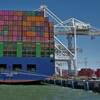Eastern Libya Ships First Oil Cargo, Defying Tripoli
Indian-flagged tanker leaves port with 650,000 barrels.
A government based in eastern Libya shipped its first cargo of crude on Monday in defiance of authorities in the capital Tripoli, a bold move that could deepen the divisions that have brought chaos since the fall of Muammar Gaddafi.
The eastern government has set up its own National Oil Company (NOC) to act in parallel to the Tripoli-based NOC that is recognised internationally as the only legitimate seller of Libyan oil.
A tanker carrying the eastern NOC's first export shipment was en route to Malta carrying 650,000 barrels of crude, a spokesman for the company said on Tuesday.
Libya's economy depends almost exclusively on oil export revenue, and the fight over who controls those funds has been at the heart of the chronic instability and civil war since Gaddafi was toppled and killed by rebels in 2011.
Parallel parliaments and governments have operated in Tripoli and the east since 2014. Much of the country is in the hands of dozens of armed groups that proclaimed loyalty to one or the other of the two rival governments, while small areas are controlled by Islamic State fighters.
The India-flagged tanker Distya Ameya left the eastern Libyan port of Hariga on Monday evening, eastern NOC spokesman Mohamed al-Manfi said, adding that the tanker has entered international waters.
A Reuters tracking system showed the Distya Ameya about 250 km (155 miles) north-east of Hariga early on Tuesday.
The eastern NOC has long been trying to sell its own oil, but until now those efforts have been blocked by the NOC in Tripoli, with the support of Western countries.
The NOC in Tripoli says any sale by its eastern rival would breach U.N. Security Council resolutions and put the future of Libya's economy at risk.
The NOC in Tripoli has continued to run oil production throughout the crisis that followed Gaddafi's fall, with the funds paying state salaries across Libya, including many of the rival armed groups, which have generally been granted official status.
The Tripoli NOC has retained strong international backing, and says it is working to plan future oil sales with a new U.N.-backed unity government that arrived in the capital late last month. The unity government includes figures from across Libya's divides, but has not yet been fully accepted by either of the two loose alliances fighting for power since 2014.
PARALLEL INSTITUTIONS
News of the eastern NOC's effort to export its first shipment of oil emerged late last week, when the NOC in Tripoli said it had prevented port workers from loading oil onto the Distya Ameya.
It said the shipment had been ordered for a company called DSA Consultancy FZC, registered in the United Arab Emirates. Reuters was unable to locate contact information for the firm.
A U.N. Security Council resolution last month said the unity government had the "primary responsibility" for preventing illicit oil sales, urging it to communicate any such attempts to the U.N. committee overseeing Libya-related sanctions.
The resolution also restated a call for member states to cease contact with any "parallel institutions".
In 2014, a group pressing for more autonomy in eastern Libya shipped crude from Es Sider terminal, but U.S. special forces boarded it off Cyprus and forced it to return.
On Monday the U.S. embassy for Libya said it was "very concerned about Libyan oil purchases outside of traditional channels".
Political divisions, labour disputes and security threats have reduced Libya's output to less than a quarter of the 1.6 million barrels per day produced before the uprising.
By Ayman al-Warfalli













